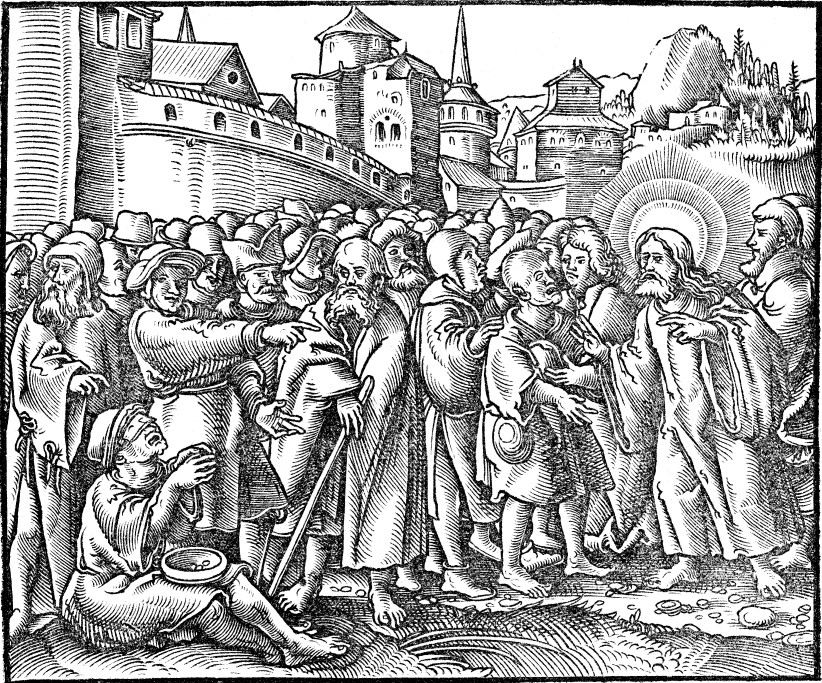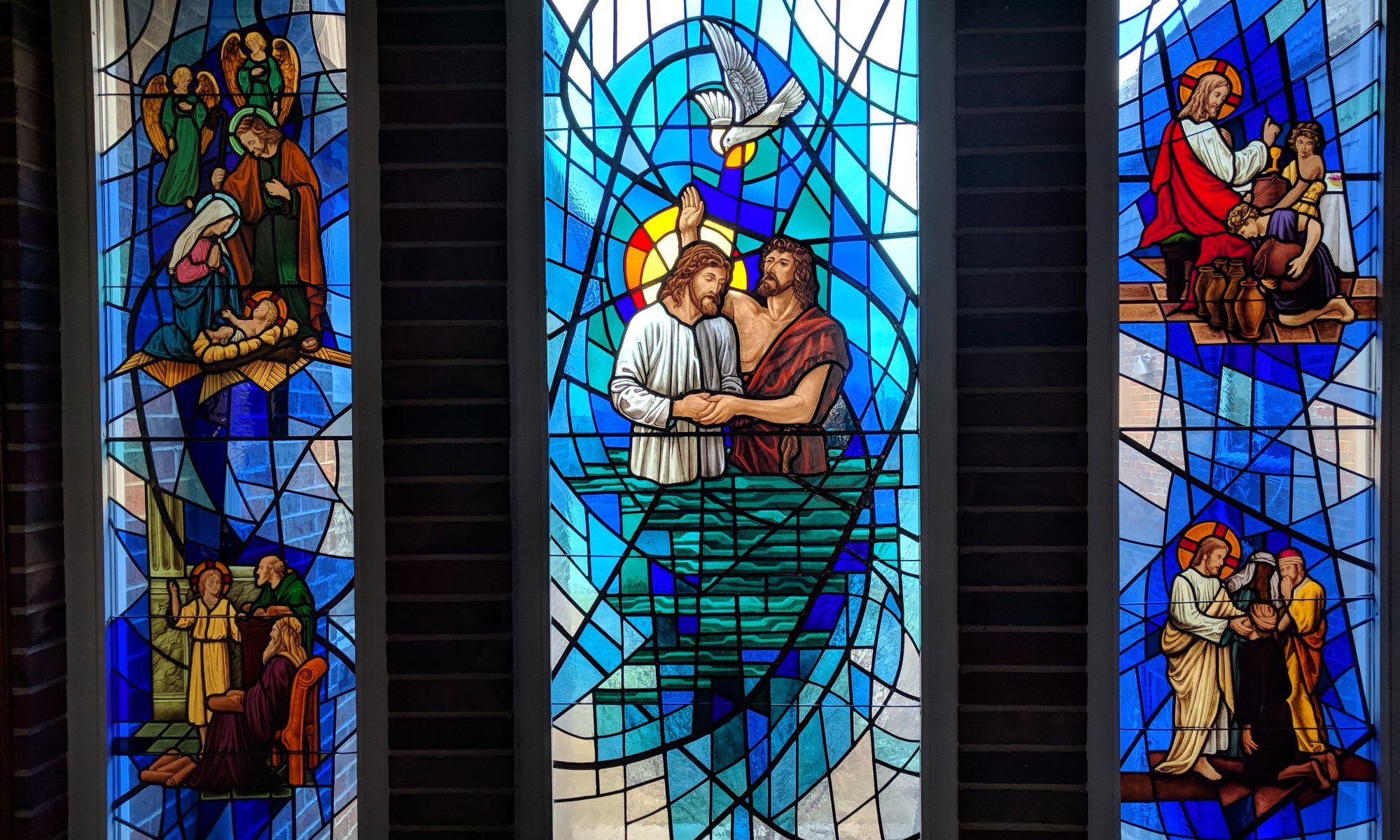
Lessons: Isaiah 35:3-7, 1 Corinthians 13:1-13, Luke 18:31-43
Hymns: LSB 573, 587, 758, 556, 417
Grace, mercy, and peace to you from God our Father and our Lord and Savior, Jesus Christ. Amen.
Most of you know very well why Jesus was born, what He came to do, and why He did it. After all, you have been hearing these things through faithful preaching for many years. If you attend regularly and pay careful attention, you have been well taught and catechized. As a result, you may either take the saving Gospel for granted or you may cherish it, love it, and cling to it—refusing to let it go.
It is tempting to think that everyone who goes to a Christian Church knows and understands well why Jesus came and what He accomplished in Jerusalem. But sadly, this is not the case. Some teach salvation is possible apart from the cross of Christ and the bloody atonement. Some pit the sacraments against Christ and His Gospel. Some churches ignore salvation altogether. Even in our Lutheran churches, biblical literacy is not always very good. And in some places where there is high biblical literacy, the emphasis is not on the life and works of Christ, but on other matters that pull the hearts and attention of God’s people away from the Savior of the Nations.
We should have that 20/20 hindsight vision to know the purpose of Jesus’ coming, but Satan loves to mislead people into false belief, despair, and other great shame and vice. Even though the things that happened to Jesus were written of Him in advance, the disciples who had been trained and taught by Jesus still did not understand what Jesus must do as He set His journey toward Jerusalem. In fact, it was hidden from them, and they did not grasp what was said. And this is the group of men Jesus was raising up to serve as apostles who would go all over to proclaim the Good News of Jesus!
In our Gospel, Jesus explained the purpose of His coming. Pointing out that everything written about the Son of Man by the prophets will be accomplished, Jesus said He will be delivered over to the Gentiles and will be mocked and shamefully treated and spit upon. After flogging Him, they will kill Him, and on the third day, He will rise from the dead (Luke 18:31-33).
His words are clear, yet St. Luke reports that they understood none of these things. And this isn’t even the first time Jesus addressed His upcoming passion to His disciples. In His first prediction, St. Matthew reported, “From that time Jesus began to show his disciples that He must go to Jerusalem and suffer many things from the elders and chief priests and scribes, and be killed, and on the third day be raised. And Peter took Him aside and began to rebuke him, saying, ‘Far be it from you, Lord! This shall never happen to you.’ But [Jesus] turned and said to Peter, ‘Get behind me, Satan! You are a hindrance to Me. For you are not setting your mind on the things of God, but on the things of man’” (Matt. 16:21-23). That is one sharp rebuke spoken by Christ our Lord to the Apostle Peter!
This is so, because the first rebuke spoken by Peter trying to forbid Jesus from going to the cross was put into Peter’s mouth by Satan. Peter, loving his relationship with Jesus, did not want to see Jesus undergo His passion to redeem the world of sin through His death. You would think that Peter should be ok with what Jesus said since Jesus said He would rise from the dead on the third day. Evidently, though, that did not give Peter any comfort. Instead, he was fixated on what Jesus first said—that Jesus would suffer many things and be killed. Peter was scandalized by what Jesus must do, as are many today.
Their repulsion over what Jesus must do to redeem the world is identified by the words of Jesus when responding to Peter. Jesus said, “You are not setting your mind on the things of God, but on the things of man.” Isn’t that the truth? When people want to reject salvation by grace through faith in Christ alone who alone went to the cross to redeem the world through the payment of His Blood, they are not setting their minds on the things of God, but on the things of man. They want a way to salvation apart from blood. They want life without death on the cross. They want forgiveness without redemption through Christ. Their focus is on earthly things, rather than heavenly things.
The second time Jesus predicts His Passion, Jesus said, “The Son of Man is about to be delivered into the hands of men, and they will kill Him, and He will be raised on the third day.” You would think they would be glad that Jesus is doing the work of the promised Messiah, but instead St. Matthew reported that the disciples were exceedingly sorrowful and greatly distressed (Matt. 17:22-23). Instead of rejoicing in their forgiveness being earned and their salvation being won by the Crucified One, their hearts were becoming heavily weighed down as they considered what Jesus was about to endure. This time, however, none of the disciples argued with Jesus. They resigned to the reality that Jesus must do these things. But they will still argue against Jesus over going into Jerusalem. You see, when Jesus was beyond the Jordan and knew that his friend Lazarus had died, Jesus said, “Let us go to Judea again.” But the disciples tried to dissuade Him, saying, “Rabbi, lately the Jews sought to stone You, and are You going there again?” (John 11:7-8 NKJV). Yet, Jesus goes to Bethany, which is near Jerusalem, so that He could raise Lazarus from the dead.
By raising Lazarus, Jesus is proving He has power over death and the grave. By healing blind Bartimaeus, Jesus is opening the eyes of the blind that they may see clearly the Gospel of Jesus Christ. When Jesus raised Lazarus, many rejoiced and began following Him. You would think this stunning miracle and act of love would result in much joy among all the people. Yet, St. John reported, “The chief priests made plans to put Lazarus to death as well, because on account of him many of the Jews were going away and believing in Jesus” (John 12:10-11). They had already begun their plot to kill Jesus. St. John also wrote, “From that day on they made plans to put him to death. Jesus therefore no longer walked openly among the Jews, but went from there to the region near the wilderness, to a town called Ephraim, and there he stayed with the disciples. Now the Passover of the Jews was at hand, and many went up from the country to Jerusalem before the Passover to purify themselves. They were looking for Jesus and saying to one another as they stood in the temple, ‘What do you think? That he will not come to the feast at all?’ Now the chief priests and the Pharisees had given orders that if anyone knew where he was, he should let them know, so that they might arrest him” (John 11:53-57).
Despite these realities, Jesus still, as St. Luke reported, “set His face to go to Jerusalem” (Luke 9:51). He was, as the great hymnwriter, Paul Gerhardt, wrote, the Lamb who went “uncomplaining forth The guilt of sinners bearing And, laden with the sins of earth, None else the burden sharing; Goes patient on, grows weak and faint, To slaughter led without complaint, That spotless life to offer, He bears the stripes, the wounds, the lies, The mockery, and yet replies, ‘All this I gladly suffer’” (LSB 438:1).
In the third time Jesus predicts His Passion, He spells things out even more clearly. As we heard in today’s Gospel, Jesus said, “See, we are going up to Jerusalem, and everything that is written about the Son of Man by the prophets will be accomplished. For he will be delivered over to the Gentiles and will be mocked and shamefully treated and spit upon. And after flogging him, they will kill him, and on the third day he will rise” (Luke 18:31-33). This fulfills Isaiah the prophet who wrote concerning the Suffering Servant, “He was pierced for our transgressions; He was crushed for our iniquities; upon him was the chastisement that brought us peace, and with his wounds we are healed. All we like sheep have gone astray; we have turned—every one—to his own way; and the Lord has laid on him the iniquity of us all. He was oppressed, and he was afflicted, yet he opened not his mouth; like a lamb that is led to the slaughter, and like a sheep that before its shearers is silent, so he opened not his mouth” (Isaiah 53:5-7).
You see, Jesus was not going to Jerusalem as a blind lamb with no purpose. He was going to the cross to redeem the world. The sins you’ve committed? Jesus paid for them. The things that make you continue to feel guilty? Jesus has cancelled that guilt out. The temptations you face? Jesus bore them, too, and counts you as righteous in His sight and acceptable to Heaven. This is the clear reality of the Gospel, which Jesus accomplished on our behalf as He suffered and died, carrying the weight of the world’s sin.
Even though Bartimaeus was blind, he could see through the eyes of faith. When he learned Jesus of Nazareth was passing by, in faith, the blind man said, “Jesus, Son of David, have mercy on me!” Even as those around him were telling him to hush up, he cried out all the more, “Son of David, have mercy on me!” Jesus knew the blind man’s request, yet He asked anyway, “What do you want Me to do for you?” And the blind man replied, “Lord, let me recover my sight.” Jesus said, “Recover your sight. Your faith has saved you.”
In the same way, the clarity of the Gospel has been preached to us so that we may make our petitions in faith before the Lord. He cleanses us of our sin and opens our eyes to the Gospel of Christ. The darkness that once covered us has been replaced with the light of Christ (Matt. 4:12-17). It is important that we remain faithful to Christ, receiving only His pure Word so that we are not shrouded under the darkness of false belief, despair, or other great shame or vice, but that we are brought into the light of the Gospel so that we would cling to Christ alone and receive the salvation Jesus offers by faith. Amen.
The peace of God which passes all understanding keep your hearts and minds in Christ Jesus to life everlasting. Amen

